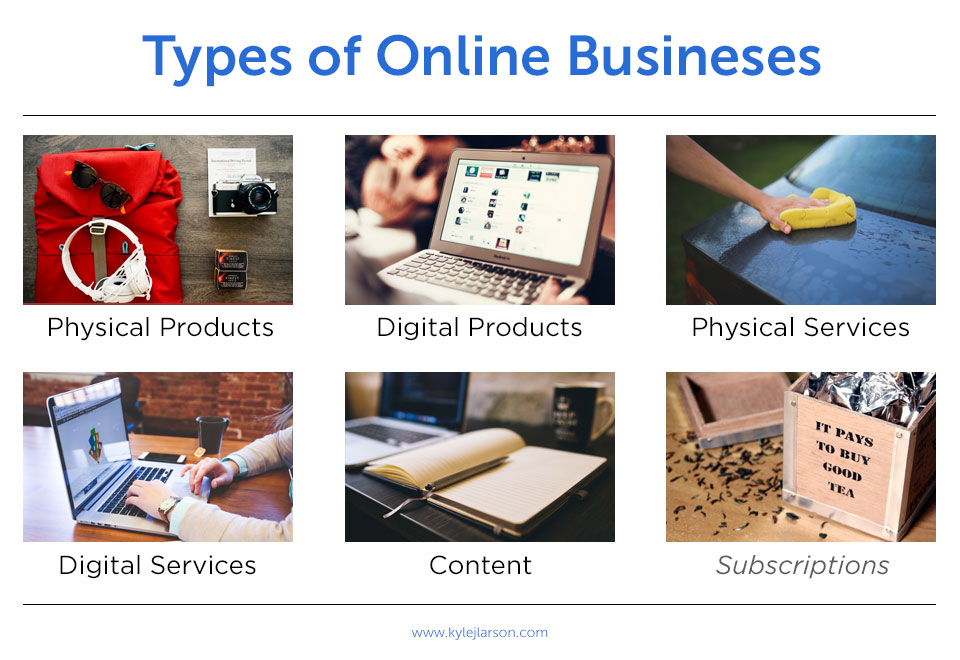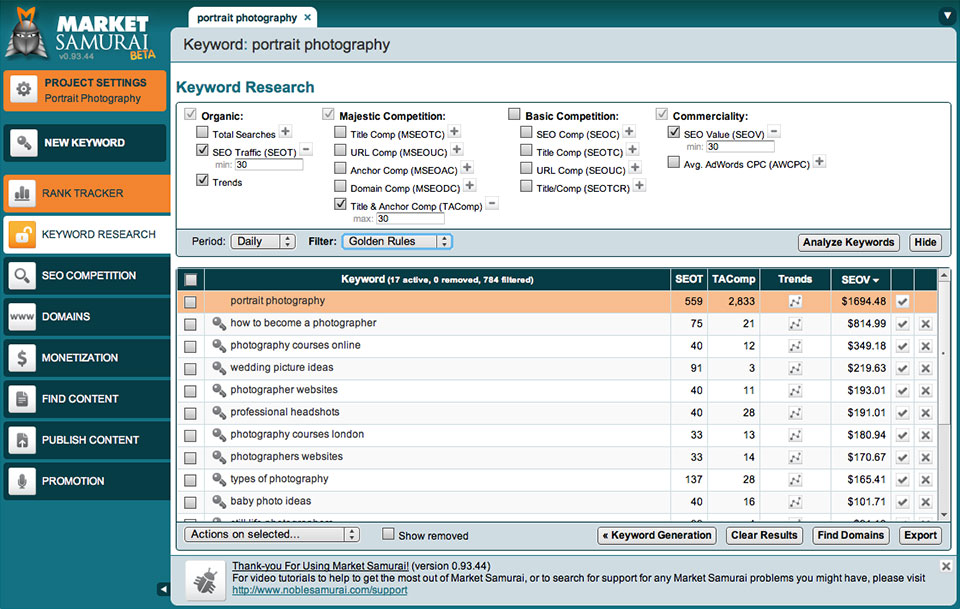Finding Your Niche – Discovering Great Online Business Ideas
October 5th, 2016 by Kyle J. Larson
Trying to start a business can be a challenging experience. Some people have a million ideas and don’t know what to choose or where to start. Others can’t seem to come up with any ideas that seem good enough to move on. You may have heard before that it’s not the idea but the execution that makes a successful business, and that is true, but starting from a good foundation will make that journey much easier. Here are some tips for finding your niche and starting a business that I’ve found helpful from people who successfully started large businesses and my successes and failures in small online businesses.
Types of Online Businesses
Before coming up with a specific business idea lets go over the types of businesses you might start. When generating ideas you’ll want to get as many as possible so it’s important not to pigeon-hole yourself into thinking “I must sell a product” or “I need to start a blog”.
First off, you don’t always need to have experience in a specific type of business for it to be the right choice for you. Blake Mycoskie who founded Tom’s Shoes didn’t have any experience making shoes before he started the company. He saw that children were in need and decided that the most sustainable way to make that happen was to build a profitable business with charity at it’s core. He took that grand vision and then started by figuring out what he’d need to know to make it work. If you understand the big picture, but focus in on the first small step to get it going it’s not as intimidating.
Here are a few different types of businesses that you might start:
- Physical products (clothing, devices, home goods)
- Digital products (software, ebooks, media)
- Physical services (maid service, speaking/consulting, repairs)
- Digital services (web/graphic design, software development, copywriting, SEO consulting)
- Content (monetized through ads, affiliates, or subscriptions)
- Subscription services (consider selling any of the above as a subscription)
Try applying these business types to your ideas below.
Coming Up With Online Business Ideas
If you’re looking to start a business but don’t have an idea yet there are two primary sources of input to tap into: internal and external. This is going to be a brainstorming session around finding your niche, so create a list somewhere (paper, Evernote, Word, etc). Don’t worry about which ideas are great or which are terrible… just get as many ideas as you can. We’ll filter them later.
For internal ideas, start a separate list to the side and write down broad topics that you’re interested in or where you have existing skills. My own list looked something like this:
- golf
- grilling
- web design
- coding
- software
- art
- t-shirt design
- local music & events
- setting goals
- learning
- reading
- dogs
Then use this list to start generating business ideas. Start by thinking of different niches within each area combined with business types listed above. Or even try combining two ideas. For example here’s a list of ideas I might have relating to my interest in golf:
- App to track golf betting games amongst friends
- Membership site for golf training videos
- Content site detailing progress in golf training and equipment
- Custom putters
Next, external ideas can be sought out online or in day to day life. It’s a good idea to start a list of ideas that come to you during the day (I have a running list in Evernote). You can prompt yourself by planning to come up with at least 1 idea per day. Eventually you’ll start noticing ideas or pain-points throughout your day that could be turned into business ideas. Again, keep in mind that many of these ideas you may never actually pursue, we just want to build a good list to choose from.
Another source of external ideas can be looking at message boards within your various areas of interest. What are people talking about? What complaints do they have? Take a look at what businesses are doing in other industries and see if there is a parallel to the industries you’ve selected. For my golf example, maybe there’s an opportunity to do what Yelp is doing for restaurants but for golf courses.
Finding Your Niche by Organizing Your Business Ideas
Once you’ve got a nice long list, you can start to prioritize it. Either sort them in order of what you might consider doing or mark the ones that you consider the most interesting opportunities. Even if you think something might be difficult, if it seems like a good opportunity, include it. We’ll go through each of these ideas and try to narrow them down even further.
Passion vs Practicality
Now that we’ve got a narrowed down list of ideas, we can start to dig a little deeper into them. People often ask about following their passion vs doing what they’re good at. I think the reality is that either can be a good thing, but you need to have some practical expectations.
If you follow your passion, you’ll have the benefit of being excited about what you’re working on. The reality though, is that often passion projects won’t have the scale of other opportunities. If you’re passion happens to line-up with a large market that you can serve in a unique way, then great! If you’ve got a passion for something that isn’t very profitable, large, or if it’s just something you’ve got no skill in, try and set your expectations appropriately. If all you want out of a side hustle is some fun and maybe a little money, then great. If you expect it to make you rich, then I’d reconsider.
If you choose a business to fit a market there are a different set of upsides and potential issues. On the upside, if you succeed you’ll likely have greater rewards. On the downside, having a successful business takes a ton of work, and if you can’t find a reason to be passionate about it, you’re not likely to put in the time and effort required.
Setting Optimal Conditions
Here are two suggestions that will help you create an optimal condition for success with your business idea. One is finding opportunities with tasks that can create a flow state. This is the state where you’re so deep in your work that it’s pleasurable and you lose track of time. You can often achieve this state when you’re doing something that you’re very good at (even if it’s not your passion). This is why it’s helpful to pick an idea that relates to your skills in some way.
The other is discovering your ‘why’. In his TED talk and book, Simon Sinek discusses how most companies begin with a focus on ‘what’ or ‘how’ but not ‘why’. For example, putting the focus building an app or serving a particular market instead of a deeper why. Companies that start with why find it easier to retain customers, reach employees and make decisions. Some of his examples include Apple’s focus on being different and fighting the “industry elites”, and Southwest Airlines bringing air travel to the common man. His TED talk is well worth watching to get a better idea of why this is so helpful.
How Niche to Get
Another question you may have when finding your niche is “how niche of a market should I choose?” (e.g. golf equipment vs handmade custom putters). There are a few ways to make this decision. One might be finding the ‘why’ for your company, as described above this helps determine what market you need to enter.
Also consider your ultimate goal for the business. If you’re hoping to make a giant company you’ll need a market size that can support it, or to find a niche in that market where it makes sense to grow into other offerings. If you’re making expensive custom putters, it’s going to be tougher to transition into clubs for the common person (you could certainly do it, but it won’t make any sense to your customers and may hurt your business identity). Often picking a specific niche means your customers will be more passionate, willing to pay more, and the market will be easier to enter and dominate.
Picking a large area of focus may mean the opportunity is larger, but it’ll also usually mean it’s much tougher to get market share. It can also mean a higher cost to get going (in time or money). Consider the ‘why’ for some of your ideas and, if they are small niches, consider where you could expand the idea. Keep in mind there’s nothing wrong with a small business with a singular focus. You might even enjoy building a number of smaller businesses that can eventually run themselves.
Once you’ve narrowed your list a bit more it’s time to do some market research to help decide on a final idea to pursue.
Also check out the How to Make Your Blog Series by Shashank Gupta.
Market Research
Market research is a fairly dense topic and deserves and article of it’s own, however here are few tips to get you started. First of all, try Googling some of the primary terms for your idea to see what else exists out there. Don’t get frightened off if there is competition. Competition just means that there is likely a market worth going after. Unless you’re truly inventing something that’s never existed before, there should be some competitors. This research should be conducted to get an understanding of how strong they are and where they fit into the market.
Try and discover where your business might fit into the existing market. Can you do better than what is out there? Can you focus on a different segment of the market? Can you offer a different form of delivery?
Another good way to make sure there is an existing market is to use an SEO tool. You can use a free tool like Google’s Keyword Research Tool or a purchased tool like Market Samurai (see my Market Samurai review) or SEO Power Tools. You can use these tools to enter a list of keywords and see roughly how much search traffic they get and about how much money the ads cost for those terms.
Use this data in combination with your competitive research to try and figure out where you might rank in search and what kind of traffic you could bring in. Depending on what type of business you’re going into, you may find that advertising is a good, quick way to bring in customers as long as the ad cost is lower than what those visits can earn for you.
Good luck on getting started! All it takes is some persistence and you’ll have a bunch of ideas to run through and vet as possible options. The tough part is then breaking it down into steps and sticking with it. If you have any other things you’ve found helpful please share in the comments below!
Now that you’ve got a great business idea check out this guide to finding a creative blog name.




2 Comments
Vince Arnone
Great post Kyle. Having gone down many poorly planned roads before, the Simon Sinek video you linked was a big help – very good material for a post on choosing the direction of your project. Love your site and thanks for sharing!
Kyle Larson
Thanks Vince, I appreciate it!